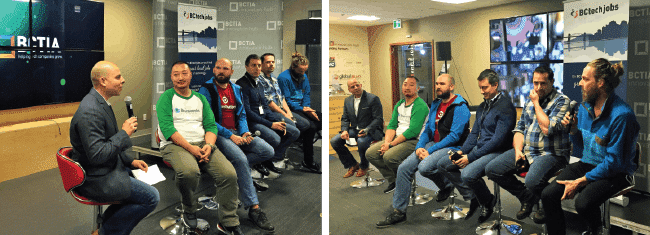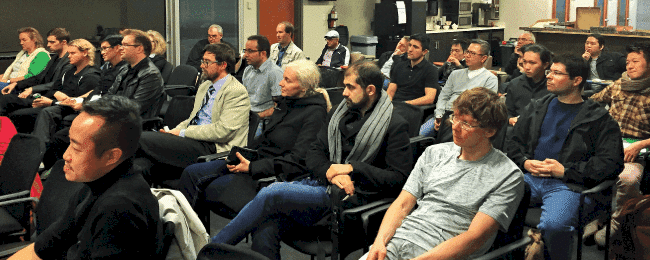18 Nov 2015 Talent Meetup: Life of a Startup Developer Recap
On November 17th the BCTIA, in partnership with BC Tech Jobs, hosted a group of technology professionals at the Innovation Hub to listen to insights from a guest panel on “Life of a Startup Developer”. The panelists – Rollie Ma from Beanworks, Vlad Karukes from EDP Software, Martin Popielarz from MyBestHelper, and Matt Smith and Ben Schock from Thinkific – shared their experiences working for a startup and had a very engaging conversation about the benefits and challenges of a startup environment. All attendees then had a chance to network and continue the conversation with the panel speakers over pizza and beverages to learn more about their experiences and their startups – who, by the way, are all hiring.

If you missed it, here are some of the valuable insights panelists shared:
Why work for a startup?
Ability to contribute on a bigger scale, make decisions and make the biggest impact. Opportunity to be different, to be more than another small fish in a big pond, to make something that’s cool and you are proud of. Chance to take full control of what you do, avoid bureaucracy, touch different areas of the business, and learn new things. Innovation, transparency, and adoption of new technologies.
What does it take to be successful in a startup environment?
Being dependable, owning projects and taking initiative. Having a great team and feeling like an integral part of the success of the startup itself. Being direct and acting fast. Having the flexibility to cover for other team members when needed, dealing well with ambiguity, and being able to make trade offs. Not being afraid to make mistakes or taking scary leaps of faith, and never stop learning. Showing dedication, versatility, and, most importantly, caring!
Comp Sci, coding camps, self learning… What’s the best way to go?
There’s a difference between coding and software architecture; start with coding but dive deeper, as it’s hard to make decisions if you don’t have the right knowledge. Coding camps are great to hit the ground running on coding, whereas Comp Sci is important to solve complex problems. However, what really matters is how much you want to learn and how much effort you’re willing to put in. It’s important to know foundations and basics, but even with formal education there is still a lot you need to do to become successful, so keep learning and keep moving, and never get stuck in technology. At the end of the day, many companies hire based on experience, not type of education.
What is the difference between a good developer and a great developer?
Caring. Having experience, as it builds skills and knowledge, and some things are only learned over time. Having a variety of skill sets. Being a team player and reliable, talking to others about your work and challenges. Controlling technical depth in a very organized way. Being dependable, taking initiative, and constantly putting himself/herself in other people’s shoes – why do we need to get this done? Thinking beyond development and always delivering a little bit extra.
Good developers solve problems on time so business decisions are satisfied; great developers are also part of defining the problem. It’s important to understand how solutions interact with all other pieces of the puzzle, remain stable, come together as a whole product, impact the future, and continue to move forward when you’re no longer there.
What is the biggest challenge your startup currently faces?
Finding great developers. Doing something different from competitors to revolutionize the market. Finding the capacity to try new things. Going through the process of trying, testing, and making a decision on moving forward or not without frustrating the team, which requires seeing the bigger goal and understanding that we are building intellectual property, not product. Managing expectations of too many people wanting too many things. Thinking collectively and defining who is best suited to build what within the team. Managing time and prioritizing what needs to be done in the midst of so many demands and new features to be implemented, and dropping what’s not important. Not using shortcuts when time to deliver is limited, but rather building a solid and scalable product.
How do you deal with the instability of startups?
While startups are not as stable as bigger companies, startup developers are so diverse in skills that they will not have a problem finding a job elsewhere if need be, so why not take a leap of faith?

Join our Talent Meetup as a guest or speaker to connect with other technology professionals, promote your brand, share your expertise, and potentially find great candidates!

